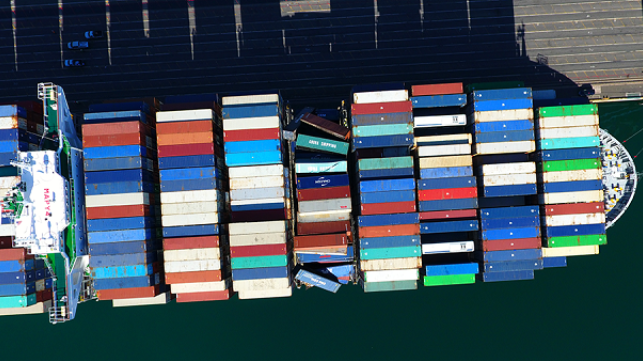
By The Maritime Executive 01-19-2020 05:39:55
The U.K. Marine Accident Safety Board (MAIB) has released its investigation report into the collapse of three container bays and loss of 137 containers from CMA CGM G. Washington during heavy weather while on passage from Xiamen to Los Angeles on January 20, 2018.
The investigators concluded that the collapse of all three bays probably occurred during the 20° rolls. The amplitude of the rolls exceeded the ship’s estimated roll limits and were almost certainly the consequence of parametric rolling (where rolling occurs in phase with pitch), which had been recorded by the ship’s motion monitoring decision support tool. The risk of parametric rolling was not identifed by the master or his bridge team because they were unaware of the full capabilities of the decision support tool, and therefore were unaware of its predictions.
The investigation identified several factors that would have adversely affected the safety of the container stows on deck. These included: reduced structural strength of non-standard 53ft containers, inaccurate container weight declarations, mis-stowed containers and loose lashings. The report concluded that:
• Bay 54 collapsed because the acceleration forces generated during the large rolls exceeded the structural strength of the non-standard 53ft containers stowed in the bay.
• Bay 58 collapsed because some of its containers were struck by the 53ft containers as they toppled overboard.
• Bay 18 collapsed as a result of a combination of factors and was probably initiated by the structural failure of one or more containers.
Action has been taken by CMA Ships, in conjunction with ABB, the manufacturer of the Octopus decision support tool, to improve its presentation of ship-handling advice to masters in bad weather. The training package for operators of this system has also been reviewed. Bureau Veritas, CMA CGM G. Washington’s classification society, has now amended its rules for the carriage of 53ft containers.
MAIB recommended to CMA Ships that it ensure that, where container terminals routinely weigh containers prior to loading, the cargo plan is updated to reflect these weights. The Maritime and Coastguard Agency has been recommended to promote U.K. container owners’ involvement in Bureau Internationale des Containers databases. Bureau Veritas is recommended to amend its rules to require require on board lashing software to display maximum pitch and roll angles for the vessel’s condition, and, to review its rules and approval procedure.
The report is available here.
source: www.maritime-executive.com


